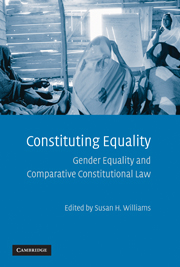Book contents
- Frontmatter
- Contents
- List of Contributors
- Acknowledgments
- CONSTITUTING EQUALITY
- Introduction: Comparative Constitutional Law, Gender Equality, and Constitutional Design
- SECTION ONE STRUCTURE
- 1 Gender Quotas in Politics – A Constitutional Challenge
- 2 Equality, Representation, and Challenge to Hierarchy: Justifying Electoral Quotas for Women
- SECTION TWO RIGHTS
- SECTION THREE CULTURE/RELIGION AND GENDER EQUALITY
- SECTION FOUR CONSTITUTIONS AND INTERNATIONAL LAW
- SECTION FIVE WOMEN IN THE PROCESS OF CONSTITUTION MAKING
- Conclusion: Gender Equality and the Idea of a Constitution: Entrenchment, Jurisdiction, and Interpretation
- Index
- References
1 - Gender Quotas in Politics – A Constitutional Challenge
Published online by Cambridge University Press: 26 October 2009
- Frontmatter
- Contents
- List of Contributors
- Acknowledgments
- CONSTITUTING EQUALITY
- Introduction: Comparative Constitutional Law, Gender Equality, and Constitutional Design
- SECTION ONE STRUCTURE
- 1 Gender Quotas in Politics – A Constitutional Challenge
- 2 Equality, Representation, and Challenge to Hierarchy: Justifying Electoral Quotas for Women
- SECTION TWO RIGHTS
- SECTION THREE CULTURE/RELIGION AND GENDER EQUALITY
- SECTION FOUR CONSTITUTIONS AND INTERNATIONAL LAW
- SECTION FIVE WOMEN IN THE PROCESS OF CONSTITUTION MAKING
- Conclusion: Gender Equality and the Idea of a Constitution: Entrenchment, Jurisdiction, and Interpretation
- Index
- References
Summary
INTRODUCTION
Constitutions and laws have recently been recognized by feminists as an important site through which decision making, influence, and power are organized and exercised. Given that laws contribute to the shaping of gender attitudes and values, laws could also be used as an instrument by which to create change. One example of constitution making in terms of gender is the adoption of electoral gender quotas. During the past ten years, an increasing number of states have enacted statutes to promote the number of women in public decision making. Today, forty-eight countries have introduced special measures in the form of legislative quotas stipulated in their constitution and/or electoral laws. In addition to these legal reforms, in more than fifty other countries at least one political party represented in parliament has adopted voluntary party quotas stipulated in its party statutes. This recent and rapid diffusion of gender quotas has been labeled a “fast track” to equal representation.
Legislative quotas have often been introduced at times when new constitutions were being written and structures of government were being rebuilt or as part of broader constitutional reforms. These situations have opened windows of opportunity for quota proponents to place questions of gender representation on the political agenda. The women's movement's long advocacy of and lobbying activities for more women in elected positions have also found more resonance, because international reputation is becoming increasingly important for political elites.
- Type
- Chapter
- Information
- Constituting EqualityGender Equality and Comparative Constitutional Law, pp. 29 - 52Publisher: Cambridge University PressPrint publication year: 2009
References
- 3
- Cited by



